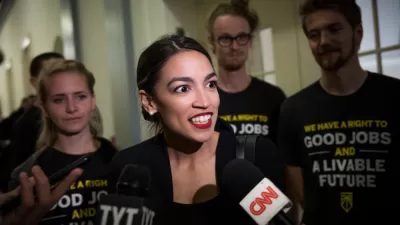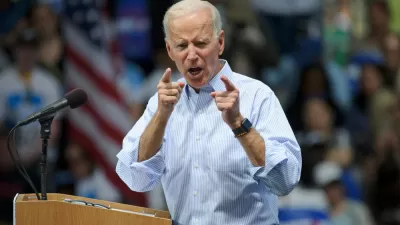Economics 101: It's difficult to reduce an activity if there's no price attached to it, so why are many environmentalists increasingly turning away from wanting to price carbon emissions?

"This month's fuel-tax riots in Paris and the defeat of a carbon-fee ballot measure in Washington state show the difficulty of getting people to support a levy on the energy sources that heat their homes and power their cars," report Zack Colman and Eric Wolff for POLITICO.
The story of the carbon tax’s fading appeal, even among groups that like it in principle, shows the difficulties of crafting a politically palatable solution to one of the world’s most urgent problems — including greenhouse gas levels that are on track to reach a record high this year.
"If it can't pass in Washington state right now, I'm not sure that says that there's much of a pathway at this moment nationally," said Sen. Jeff Merkley (D-Ore.).
California is the only state government that prices carbon emissions, using a cap-and-trade program created by the Global Warming Solutions Act of 2006, which was renewed two years ago, setting a goal to reduce emissions 40 percent below 1990 levels by 2030. Last year the state passed separate legislation to continue the cap-and-trade program through 2030.
Meanwhile, even the most liberal Democratic candidates this year gave carbon taxes scant if any mention in their climate platforms, focusing instead on proposals like a phaseout of fossil fuels and massive investments in wind and solar power.
For example, Rep.-elect Alexandria Ocasio-Cortez (D-N.Y), who supports a carbon tax, is "promoting it as just one possible element of a sweeping 'Green New Deal' that includes pouring huge amounts of money into renewable energy," note Colman and Wolff.
Could the explanation be as simple as an aversion to new taxes, particularly after the Republicans' landmark tax-cutting package?
"You do have this irony, and that is the policy that is overwhelmingly endorsed by economists of the right, the center and the left as the best way to reduce greenhouse gas emissions is inverse with what is politically feasible," said Barry Rabe, director of the Center for Local, State, and Urban Policy at the Gerald Ford School of Public Policy at the University of Michigan, who has studied carbon taxes.
Adding to the irony is that the public believes climate change is real, notwithstanding President Trump's rejection of climate science that is echoed by much of the GOP. Rabe points to a University of Michigan survey last month that found that 73 percent of Americans believe there is solid evidence of global warming.
Colman and Wolff delve into many aspects of carbon taxes—countries that have adopted and rejected them, and different types. A bipartisan congressional bill that has received much recent attention, H.R.7173 - Energy Innovation and Carbon Dividend Act of 2018, sponsored by Reps. Ted Deutch (D-Fla.) and Brian Fitzpatrick (R-Pa.), was unveiled on Nov. 27.
According to Deutch, the bill will price "carbon at $15 per metric ton of CO2e and increasing the price by $10 every year. The Treasury Department would return 100% of the net revenue back to the American people, a policy highlighted by a Treasury Department report as helping lower- and middle-income families." See one-page fact sheet [pdf].
Hat tip to Mark Boshnack.
FULL STORY: Why greens are turning away from a carbon tax

Study: Maui’s Plan to Convert Vacation Rentals to Long-Term Housing Could Cause Nearly $1 Billion Economic Loss
The plan would reduce visitor accommodation by 25,% resulting in 1,900 jobs lost.

North Texas Transit Leaders Tout Benefits of TOD for Growing Region
At a summit focused on transit-oriented development, policymakers discussed how North Texas’ expanded light rail system can serve as a tool for economic growth.

Why Should We Subsidize Public Transportation?
Many public transit agencies face financial stress due to rising costs, declining fare revenue, and declining subsidies. Transit advocates must provide a strong business case for increasing public transit funding.

How to Make US Trains Faster
Changes to boarding platforms and a switch to electric trains could improve U.S. passenger rail service without the added cost of high-speed rail.

Columbia’s Revitalized ‘Loop’ Is a Hub for Local Entrepreneurs
A focus on small businesses is helping a commercial corridor in Columbia, Missouri thrive.

Invasive Insect Threatens Minnesota’s Ash Forests
The Emerald Ash Borer is a rapidly spreading invasive pest threatening Minnesota’s ash trees, and homeowners are encouraged to plant diverse replacement species, avoid moving ash firewood, and monitor for signs of infestation.
Urban Design for Planners 1: Software Tools
This six-course series explores essential urban design concepts using open source software and equips planners with the tools they need to participate fully in the urban design process.
Planning for Universal Design
Learn the tools for implementing Universal Design in planning regulations.
City of Santa Clarita
Ascent Environmental
Institute for Housing and Urban Development Studies (IHS)
City of Grandview
Harvard GSD Executive Education
Toledo-Lucas County Plan Commissions
Salt Lake City
NYU Wagner Graduate School of Public Service





























